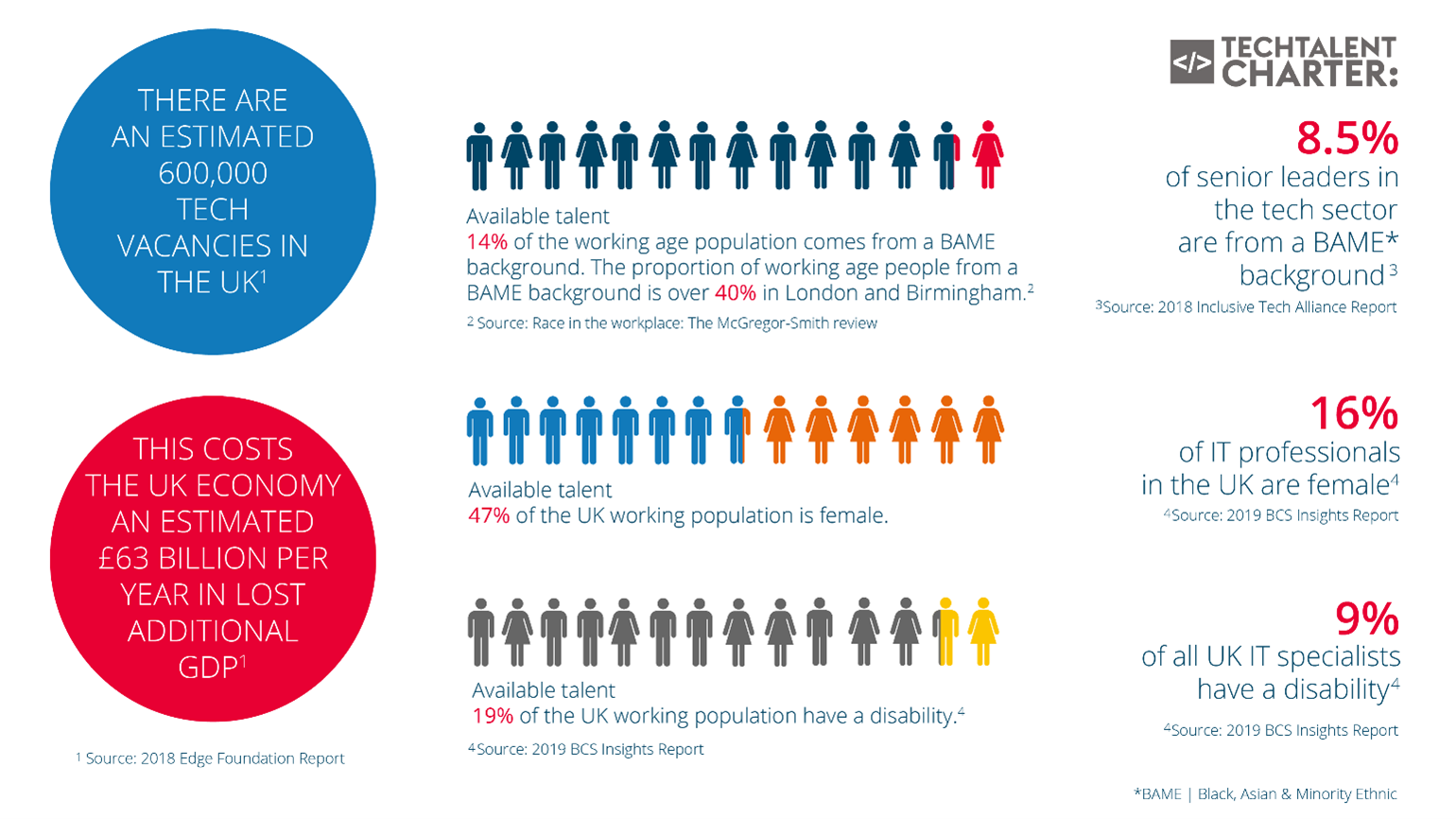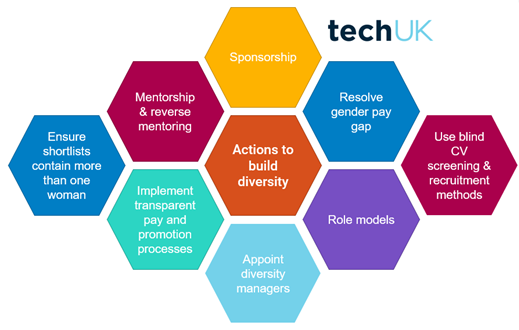techUK's ongoing commitment to improving diversity
Key statistics
- BCS: The Chartered Institute of IT (2020): In the last quarter of 2020 women made up 19% of the UK IT industry.
- Tech Nation (2021): People from ethnic minorities marginally make up a larger share of the technology workforce than they do the wider UK workforce, 11.8% for all occupations, and 15.2% for tech.
- Colorintech (2019): In a sample of the UK’s top 16 technology companies of the 152 board positions, only four were held by someone from an ethnic minority background. Of the 39 positions held by a woman, only one of these was from an ethnic minority background. In the US, 17% of tech leadership positions are held by ethnic minorities. This figure is just 2.6% on UK tech boards. Women in leadership positions fare better in the UK where they occupy 26% of board positions in tech companies compared to 20% in the US.
- Tech Talent Charter (2020): Only one in ten A-Level Computer studies students is female.
- 19% of the UK working population has a disability yet only 9% of IT specialists in the UK have a disability.

Do the right thing
techUK and its members are committed to promoting diversity and inclusion. By building a workforce that reflects the diversity of the society, we strive towards to an inclusive future for all. techUK is actively working to open up new pathways for people from diverse backgrounds to thrive in the digital economy. This will help the sector to develop better products and services that recognise diverse user needs.
Diversity is not just good for society but is also good for business. The business case makes clear the link between diverse teams, better decisions and enhanced profitability. However, particularly in the tech sector, the need to ensure the sufficient representation of underrepresented groups is more important than ever as the development and deployment of digital technologies has been accelerated by the COVID-19 pandemic.
As tech becomes increasingly pervasive, we need to take steps to ensure it works for everyone. Also, by taking a proactive approach to developing diverse talent, organisations can take a step towards future-proofing their businesses against the skills shortages that could hold back their growth.
techUK has over 830 member companies which are themselves diverse, operating across numerous sectors and all with their own individual hiring, training, and retraining practices. The journey these companies are on with their diversity and inclusion practices will be very different. However, the direction of travel is the same. By redoubling our efforts to increase diversity in tech we can not only work towards the normative and societal good of equal representation in the sector, but at the same time take important steps towards ensuring an ethical and sustainable approach to the development and use of technology.
What is techUK doing and how you can get involved
- In 2020, techUK reaffirmed its commitment to abolishing all-male panels. It is important to ensure diversity among speakers at events as we want to hear from a variety of perspectives and do not want to compound unconscious gender bias that exists within the industry. By elevating the voices of women, we can show young girls and other women that people like them are choosing our sector which then encourages women to enter the industry.
- techUK is a founding signatory and sponsor of the Tech Talent Charter - a commitment by organisations to a set of undertakings that aim to deliver greater diversity in the tech workforce of the UK, one that better reflects the make-up of the population. The Charter states that all signatories must provide data on their own workforce each year so that we can measure success and make more impactful, measurable changes as an industry for the future. A platform to share best practices to attract and retain a diverse workforce into the sector is also something the Charter provides.
- techUK Returners Hub: Returners programmes offer a supported bridge back to work for people who have taken a career break. Providing ways for people to ease back into work after a career break is a vital way to make sure we do not lose out on their talent and experience. The techUK returners hub is a one-stop-shop for people looking to return to a career in digital.
- Delivering Diversity: In 2020 techUK published a best practice report setting out how techUK members are committing to driving ethnic diversity in their workforces by inspiring the next generation, actively fishing for talent in more diverse ponds, getting workplace culture right and supporting career development. techUK will continue to share and build on this best practice with its members through 2021.
Actions to support people from diverse backgrounds to get into the tech sector and reach leadership positions
The list features evidence-based interventions that have been shown to positively affect gender equality. The findings were made by the GABI Programme, run by the UK government and the Behavioural Insight Team.

SMEs and inclusion
Data from the Tech Talent Charter’s annual Diversity in Tech reports shows clear differences between the size of an organisation and its gender representation in technology roles. In the years 2018, 2019 and 2020, the TTC found that micro-companies topped the board in having the most balanced mean gender ratio.
While micro-companies and SMEs have less capacity to deploy investment-heavy diversity and inclusion policies, for instance mentoring or Returners programmes, they have the highest gender diversity when controlled for headcount. Interviewing a large talent organisation as to why this may be the case, they reported that smaller tech start-ups and scale-up clients fare better because organisational structures are flatter. This makes implementing process and cultural change easier and faster. Without the bureaucracy of established companies, start-ups can be more encouraging of gender diversity.
Whilst many small companies are holding onto a more balanced gender split in tech roles, large organisations are the key to shifting the national picture. Large organisations have the ability to shape workplace norms and invest in innovative people practices at scale, something that smaller organisations do not often have the resources to mirror. On the other hand, small organisations are typically more agile and can pilot new ideas faster. By continuing to join the dots between diversity efforts across different organisations, we can collectively learn and innovate faster and improve D&I across the wider ecosystem.



